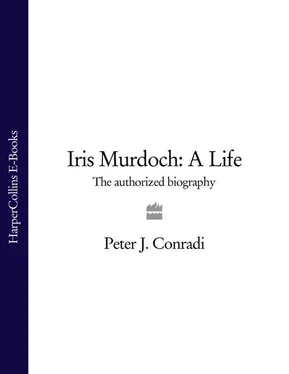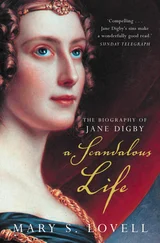The bond between Iris and Hughes was very great. He played both father and, to some degree, mother. It was said to be Hughes who bought her elaborate school outfits at Bourne & Hollingsworth on Oxford Street, when she went away to Badminton in 1932, and he shared the task of taking her to Froebel in the mornings. Redeeming himself after his schooldays, it was he who often did the laundry. Rene was no more a housekeeper than Iris turned out to be. She was ‘not a housekeeper at all’, much to grandmother Louisa’s distress. Louisa was certainly, says Sybil, horrified that her son should have to do so many of the things women were then expected to do. Cleaver, more directly, says that Aunt Ella thought of Rene as having ‘sluttish ways’, a wife who could not even cook for her husband or keep a tidy house. Sybil also remembers Hughes doing the gardening, housekeeping, laundry, much of the shopping and organising, for example, the travel arrangements for the annual Irish trip. He cooked and washed up while Rene sat back and looked pretty. No one did much cleaning. Once Cleaver was staying in Chiswick and he and Hughes came in late. ‘Have you had anything to eat?’ asked Rene, and on learning that they had not, went off to the kitchen to cook, ‘with an expression on her face’ at having to do so. Bayley takes another view. The Belfast ethos, from which Hughes was in lifelong flight, militated against Rene’s domestic virtues being fairly appraised. 43He remembers Irene cooking and washing up, smoking a cigarette, and believes she was competent without being house-proud, taking her housekeeping duties lightly. Cleaver does not recall Chiswick being very untidy. There was no home-help, no car, and no wine at home: the family could not afford it.
Hughes is remembered by John Bayley as asking either Rene or Iris or both, in his mild Ulster brogue, ‘Have you no sense at all, woman?’ The question was good-humoured and rhetorical, and there is a danger of making Hughes sound like Nora’s husband Torvald in Ibsen’s A Doll’s House. A biographer wishing to fuel such a comparison would make much of the only facial expression of her father’s Iris recorded, a look of ‘impatient nervous irritation’ which she feared she inherited; 44and of Rene’s lost singing career, a loss that probably caused Iris more grief than it did easy-going Irene. Hughes did ‘baby’ Rene, who would simply say sweetly in her Dublin brogue, ‘If that makes him happy … There’s no point in fighting over a thing like that'; ‘Well, if he wants to do that, let him get on with it.’ Rene got her hair seen to, sang in a choir, joined a swimming club (a photo of young Iris and Irene there survives), played bridge. 45There was a piano at Eastbourne Road. When Hughes died in 1958 the family were very concerned about how Rene would cope. But, as the Belfast cousins wryly put it, ‘it’s wonderful what you can do when you’ve got to’. 46She turned out to be perfectly well able to look after herself, until old age and illness supervened.
Unlike Nora and Torvald, Rene and Hughes were clearly extremely happy together. Rene increasingly saw herself as a ‘duckling that had hatched a swan’ – she didn’t know what Iris was doing, quite, but was all in favour of it anyway. 47Cleaver remembers Rene’s physical and inner beauty alike: ‘welcoming, cheerful, charming … lovely’. She was very pretty and good fun, with a happy temperament, vivacious, often laughing or smiling, a jolly and welcoming and open-hearted person. In early photographs Irene is dark-haired. Later on she dyed it blonde. Once, when Louisa, Irene and Sybil were waiting for a bus, coming home from shopping, both Louisa and Irene burdened with parcels, a gallant young man sprang to Irene’s rescue, taking her parcels for her. Poor elderly Louisa had to fend for herself. ‘Now you see what blonde hair can do for you,’ Irene quipped: if capable of being a vamp, she could also be witty.
Hughes, formal, dignified, interested in everything that was going on in the world, was more serious than Irene but seemed contented, at peace with himself. Elias Canetti would later recall him as ‘thoughtful, tremendously engaging’. 48One of his fingernails was broken and grew in a horny, claw-like shape, in evidence when he counted his cigarettes. Probably he had injured it during the war. He would speak of the long Tube journey into work, where, at a later period, he was known as ‘Old Murdoch’, 49seeming self-contained to the point of isolation, an ‘odd bird’ working on the census with a personal grade of Assistant Registrar General at Somerset House in 1950 when he retired. He did not light any fires, but worked quietly, unassumingly, ably, treating everyone with great courtesy. 50He had a sense of humour, told jokes against himself. 51
Summer holidays were usually spent in Ireland, ‘a very romantic land, a land I always wanted to get to … and discover’. 52Iris had seven first cousins, three in Ulster, four in Dublin, and doubtless sometimes felt, like Andrew in The Red and the Green, that these Irish cousins
served [her] in those long hated and yet loved holidays of childhood as sibling-substitutes, temporary trial brothers and sisters, for whom [her] uncertain affection took the form of an irritated rivalry. [She] felt [herself] indubitably superior to this heterogeneous, and, it seemed … uncultivated and provincial gang of young persons, always noisier, gayer and more athletic than [herself]. 53
They disembarked from the Holyhead boat-train in Dun Laoghaire harbour, and a two-minute walk got them to Mellifont Avenue, where at number 16 was the nursing home run and owned by Mrs Walton, Belfast-born foster-mother to Iris’s cousin Eva Robinson, seven years Iris’s senior, and closer to her than Rene’s sister Gertie’s four sons. Eva, who had polio as a child and wore a leg-brace, was protective and kind to the younger Iris. Mrs Walton’s new address at Mellifont Avenue – she had previously had a stationery shop – was convenient, too, for the salt-water baths at the end of the road, where they all swam. Eva and Iris shared a love of ‘stories’, and as they sat on the rocks on Dun Laoghaire beach Eva would make up enthralling tales. 54After marriage in 1941 Eva and her husband Billy Lee shared 34 Monkstown Road with Iris’s grandmother Elizabeth Jane ('Bessie') Richardson and Mrs Walton, until the deaths of the two older women in 1941 and 1944 respectively. Iris used Eva as a model in her only published short story, ‘Something Special’. 55Mrs Walton and Eva worshipped at the neighbouring Anglican Mariner’s Church (now closed), and Iris and her parents almost certainly attended Revivalist meetings run by the ‘Crusaders’
there. *After Dublin there would be a longer stay in the North, whose ‘black Protestantism’ Rene did not always look forward to, but met with good grace. Hughes’s sister Sarah and her husband Willy from Belfast rented a different house for one month each summer for themselves and their three children, Cleaver, Muriel and Sybil, in the seaside town of Portrush. There the Murdochs joined them. William Chapman, from a farming community near Lisburn, had gone to the Boer War with the Medical Corps on the strength of knowing a little pharmacy, and won a stripe there. On his return he taught himself dentistry and, though without professional qualification, did very well. When he was about fifty he contracted multiple sclerosis.
Family prayers featured during these holidays. Swimming in the Atlantic breakers off Portstewart strand was one source of fun, 56board games in the evening, which Iris enjoyed if she won, another. (Presumably, since the Chapmans were Brethren, games with ‘court’ playing cards were excluded.) Iris is not recalled as always a good loser, though she could be even-tempered too. On one occasion she was painting, which she loved. After she broke off cousin Sybil thought she would help by tidying up all her paints. When Iris came back to continue, the special colours she had prepared had been cleaned away. She calmly set about mixing similar ones. The Chapmans recall Iris’s goodness, kind-heartedness, strangeness, strong will and shyness. Self-effacing cousin Muriel, to whom Iris was always closest, a closeness later strengthened when Muriel taught in Reigate during the war, protected her. Saying goodbye, Iris would occasionally ‘fill up’ and be tearful: she cried without difficulty. Sybil never saw this emotionalism in Irene, who was far more happy-go-lucky.
Читать дальше










